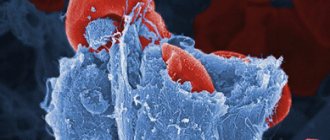Tumor marker carcinoembryonic antigen CEA (CEA), (blood)
1. GENERAL PROVISIONS
1.1. These Regulations (hereinafter referred to as the “Regulations”) were adopted by the Limited Liability Company “Medoblako” (hereinafter referred to as the Operator) and are intended to determine the basis of the Operator’s activities to ensure the safety and confidentiality of personal data of citizens in accordance with the requirements of the current legislation of the Russian Federation, as well as for the purpose of regulating the procedure for working with personal data in the Organization.
1.2. The Regulations were developed in accordance with the Operator’s Charter, Federal Law No. 152-FZ dated July 27, 2006 “On Personal Data”, Federal Law No. 323-FZ dated November 21, 2011 “On the Protection of the Health of Citizens in the Russian Federation”, legislative acts of the Russian Federation.
1.3. This provision is mandatory for compliance by all employees of the Operator.
1.4. The Regulations come into force from the moment of its approval by the order of the General Director of the Operator and are valid until the approval of the new Regulations.
1.5. All changes and additions to the Regulations must be approved by order of the General Director of the Operator.
2. TERMS AND DEFINITIONS
2.1. Personal data is any information relating to a directly or indirectly identified or identifiable individual (subject of personal data).
2.2. Processing of personal data is any action (operation) or set of actions (operations) performed using automation tools or without the use of such means with personal data, including collection, recording, systematization, accumulation, storage, clarification (updating, changing), extraction, use, transfer (distribution, presentation, access), depersonalization, blocking, deletion, destruction of personal data.
2.3. Automated processing of personal data – processing of personal data using computer technology.
2.4. Personal data operator is a person who, independently or jointly with other persons, organizes and (or) carries out the processing of personal data, as well as determines the purposes of processing personal data, the composition of personal data to be processed, and actions (operations) performed with personal data.
2.5. Submission of personal data – actions aimed at disclosing personal data to a certain person or a certain circle of persons.
2.6. Dissemination of personal data – actions aimed at disclosing personal data to an indefinite number of persons.
2.7. Destruction of personal data – actions as a result of which it becomes impossible to restore the content of personal data in the personal data information system, and (or) as a result of which material media of personal data are destroyed.
2.8. Depersonalization of personal data are actions as a result of which it becomes impossible to determine the ownership of personal data by a specific subject of personal data without the use of additional information.
2.9. Subjects of personal data are the Operator’s employees, employees and representatives of the Operator’s current and potential counterparties, current and potential clients of the Operator, representatives (by force of law and by proxy) of the Operator’s current and potential clients.
3. PRINCIPLES, GOALS AND METHODS OF PROCESSING PERSONAL DATA
3.1. In its activities, the operator ensures compliance with the principles of processing personal data specified in Art. 5 of the Federal Law of July 27, 2006 No. 152-FZ “On Personal Data”.
3.2. The operator collects and further processes personal data for the following purposes:
— maintaining personnel, accounting and tax records;
— actual implementation of the types of activities provided for by the Operator’s constituent document, external and internal control of business processes;
— interaction with counterparties, conducting contractual work within the framework of the emergence, change and termination of legal relations between the Operator and third parties, as well as execution of powers of attorney to represent the interests of the Operator;
— consideration and recording of incoming requests of any nature, provision of information services to clients;
— implementation of remote interaction of the Operator with clients and other persons within the framework of service, information and other services through the use of telephone communications and e-mail;
— organization and implementation of a set of measures aimed at maintaining and (or) restoring the health of clients and including the provision of medical services;
— organization and implementation by the Operator of internal quality control of medical care;
— implementation of remote interaction between the Operator and clients and other persons through the Operator’s website on the Internet.
3.3. The processing of personal data by the Operator includes collection, recording, systematization, accumulation, storage, clarification (updating, changing), extraction, use, transfer (distribution, provision, access), depersonalization, blocking, deletion, destruction of personal data.
3.4. The operator processes personal data using automation tools and without the use of automation tools.
3.5. The operator has established the following conditions for terminating the processing of personal data:
— achieving the goals of processing personal data and the maximum storage periods for personal data established by the legislation of the Russian Federation;
— loss of the need to achieve the purposes of processing personal data;
— submission by the subject of personal data or his legal representative (representative by proxy) of documented information that personal data was illegally obtained or is not necessary for the stated purpose of processing;
— impossibility of ensuring the legality of the processing of personal data;
— withdrawal by the subject of personal data of consent to the processing of personal data, if the preservation of personal data is no longer required for the purposes of processing personal data;
— expiration of the statute of limitations for legal relations within the framework of which the processing of personal data is or was carried out.
3.6. The operator processes biometric personal data with the consent of the subjects of personal data.
3.7. The operator processes special categories of personal data on health status in accordance with the requirements of legislation on protecting the health of citizens in the Russian Federation.
3.8. With the written consent of the Operator’s employees, employees of the Operator’s partners and clients, their personal data may be posted on the Operator’s website.
3.9. Measures to properly organize the processing and ensure the security of personal data:
3.9.1. Ensuring the security of the Operator’s personal data is achieved, in particular, in the following ways:
— appointment of a person responsible for organizing the processing of personal data, whose rights and obligations are determined by the local regulations of the Operator;
— carrying out internal control and/or audit of compliance of the processing of personal data with the Federal Law of July 27, 2006 No. 152-FZ “On Personal Data” and the regulatory legal acts adopted in accordance with it, requirements for the protection of personal data, local acts of the Operator;
— familiarization of the Operator’s employees directly involved in the processing of personal data with the provisions of the legislation of the Russian Federation on personal data, including requirements for the protection of personal data, local regulations regarding the processing of personal data and/or training of these employees;
— identifying threats to the security of personal data during their processing in personal data information systems;
— application of organizational and technical measures to ensure the security of personal data during their processing in personal data information systems necessary to fulfill the requirements for the protection of personal data;
— assessing the effectiveness of measures taken to ensure the security of personal data before putting into operation the personal data information system;
— taking into account machine (material) storage media of personal data;
— identifying facts of unauthorized access to personal data and taking appropriate measures;
— restoration of personal data modified or destroyed due to unauthorized access to it;
— control over compliance with requirements in the field of ensuring the security of personal data and the levels of security of personal data information systems.
3.10. In cases where, in order to achieve the purposes of processing personal data, the Operator transfers personal data to third parties, such transfer is carried out on the basis of a concluded agreement containing provisions on maintaining confidentiality and ensuring the security of personal data or an agreement for entrusting the processing of personal data.
3.11. The subject of personal data has the right to receive information about the processing of his personal data by the Operator, including those containing:
— information about Medoblako LLC as an operator processing personal data (name and location);
— confirmation of the fact of processing of personal data by the Operator, indication of the legal grounds and established purposes of processing personal data;
— methods of processing personal data used by the Operator;
— a list of processed personal data related to a specific subject of personal data and the source of their receipt;
— terms of processing of personal data, including periods of their storage;
— the procedure for exercising the rights of personal data subjects provided for by Federal Law dated July 27, 2006 No. 152-FZ “On Personal Data”;
— other information provided for by Federal Law No. 152-FZ of July 27, 2006 “On Personal Data,” which may include compliance with the conditions and principles of processing personal data, information on compliance with requirements for ensuring the security of personal data, possible restrictions on subjects’ access to their personal data.
3.12. The subject of personal data has the right to demand clarification of this personal data, its blocking or destruction if it is incomplete, outdated, inaccurate, illegally obtained or cannot be considered necessary for the stated purpose of processing, as well as take measures provided by law to protect his rights.
3.13. The right of the subject of personal data to access his personal data may be limited in accordance with federal laws, including if the subject of personal data’s access to his personal data violates the rights and legitimate interests of third parties.
4. COLLECTION OF PERSONAL DATA USING THE OPERATOR’S SITE
4.1. The Operator’s website uses pieces of data sent by the web server and stored on the user’s computer - “cookies” and collects the following information about visitors in order to improve the operation of the site: visitor’s IP address, date and time of visiting the site, types of browser and operating system, type and mobile device model.
4.2. When using electronic services and providing personal data through the Operator’s website, user information will not be used by the Operator for any other purposes other than to improve the operation of the website and provide services to subjects of personal data.
4.3. By using the Operator’s website and/or providing the Operator with his personal data, the website user agrees to the processing of his personal data under the conditions provided for in the Regulations.
In case of disagreement with the Regulations, the user of the Operator's website should not use this site in full, for which the user must set the appropriate privacy settings in his browser to prevent the collection of personal data.
5. PERSON RESPONSIBLE FOR THE ORGANIZATION OF PROCESSING OF PERSONAL DATA
5.1. The rights, duties and responsibilities of the person responsible for the processing of personal data are established by the Federal Law of July 27, 2006 No. 152-FZ “On Personal Data”, the Regulation “On Personal Data in Medoblako LLC” and other local acts of the Operator in the field of processing and protection personal data.
5.2. The appointment of the person responsible for organizing the processing of personal data and release from these duties is carried out by the General Director of the Operator. When appointing a person responsible for organizing the processing of personal data, the powers, competencies and personal qualities of the official are taken into account, designed to allow him to properly and fully exercise his rights and fulfill his duties.
5.3. Person responsible for organizing the processing of personal data:
— organizes the implementation of internal control over compliance by the Operator and its employees with the legislation of the Russian Federation on personal data, including requirements for the protection of personal data;
— brings to the attention of the Operator’s employees the provisions of the legislation of the Russian Federation on personal data, requirements for the protection of personal data;
— exercises control over the receipt and processing of requests and requests from subjects of personal data or their representatives.
6. RESPONSIBILITY
6.1. Persons guilty of violating the rules governing the processing and protection of personal data bear disciplinary, civil, administrative and criminal liability in the manner established by federal, regional and municipal laws, local acts of the Operator and agreements regulating legal relations with third parties.
Who needs to be tested for tumor markers?
People whose relatives have been diagnosed with tumors of various locations should take tests for tumor biomarkers as screening tests 1–2 times a year.
People who have benign tumors (adenoma, myoma, fibroma) or tumor-like formations (kidney cysts, ovarian cysts) need to be examined with the same frequency. The rest can be tested for tumor markers once every 2-3 years.
People who have undergone cancer therapy should be tested for tumor biomarkers: every month during the first year, once every 2 months during the second year, once every 3 months during the third to fifth year. Five years after cancer treatment, it is sufficient to undergo tumor marker testing once every 6–12 months.
Tumor biomarkers can be detected in urine, blood, prostatic juice, fluid taken from the pleura or abdominal cavity. Specific antibodies are added to a sample of biological fluid taken from the patient. They form specific complexes with the protein structure of the tumor marker, which are identified by laboratory methods. Non-protein tumor biomarkers are determined by other methods.
Norm of CEA in women and benign causes of increased CEA
The level of CEA in venous blood is measured in micrograms per liter or nanograms per milliliter - mcg/l, ng/ml.
When taking an analysis for CEA tumor marker, the norm in women is considered to be in the range from 2.5 to 5 μg/l
. For a number of different reasons, deviations from the norm and an increase in antigen concentration are possible. Not only oncological formations, but also other benign conditions can provoke an increase in the indicator.
The following factors increase the CEA level:
- Smoking. Those who have this habit have a higher amount of CEA antibodies by default. A concentration of up to 5-7 mcg/l is considered normal for women who smoke.
- The presence of inflammatory processes in the intestines.
- Infectious diseases.
- Pancreatitis, colitis.
- Cirrhosis of the liver.
- Bronchitis, tuberculosis, pneumonia.
- Benign formations.
The amount of cancer-embryonic antibodies is also influenced by diet, lifestyle, and level of physical activity. The rate often increases in pregnant women, but after childbirth the phenomenon goes away.
Various causes and benign phenomena in the body can increase the CEA content to 10 μg/l.
If the tumor marker level is slightly higher than normal, you should not panic and start self-treatment. It's better to consult a specialist. A doctor can correctly diagnose and prescribe therapy after an ultrasound, MRI, X-ray examination and tests for the detection of other antibodies.
Most frequently identified tumor markers
75% of cancer patients have elevated alpha-fetoprotein (AFP) levels. Most often it is elevated in liver cancer; also, its high level can indicate testicular and ovarian cancer (in 5% of cases).
The tumor marker beta-2-microglobulin indicates the development of lymphoma and multiple myeloma. Markers CA 27-29, CA 15-3 indicate possible breast cancer, CA 125 - ovarian cancer. Biomarkers LASA-P, CA 72-4 make one suspect the presence of ovarian cancer and gastrointestinal tumors. The CA 19-9 marker is detected in cancer of the pancreas.
Cancer prevention
To minimize the risk of cancer cells forming in the body, you should take care of your health, boost your immunity and suppress the activity of malignant cells. Nutrition plays an important role in cancer prevention. To bring the CEA indicator back to normal or prevent it from increasing, you should adhere to the following recommendations:
- Add green plants to your daily diet. Broccoli, cabbage, green peas are suitable, and nettle leaves are very useful.
- Some fruits and vegetables have anti-cancer properties, so emphasis should be placed on them. Recommended fruits include pineapples, apricots, citrus fruits (tangerines, lemons, grapefruits, oranges), and peaches. As for vegetables, you can lean on carrots, tomatoes, pumpkin, zucchini, and you should also add more garlic to your food.
- Qualitatively improves immunity by removing toxins from the body. Rosehip decoction or freshly brewed green tea without additives will do the job perfectly.
In addition to adjusting your diet, you should pay attention to walks in the fresh air.
, moderate physical activity, avoiding stress and receiving only positive emotions. You should also not neglect annual check-ups with a doctor and routine CEA tests.






